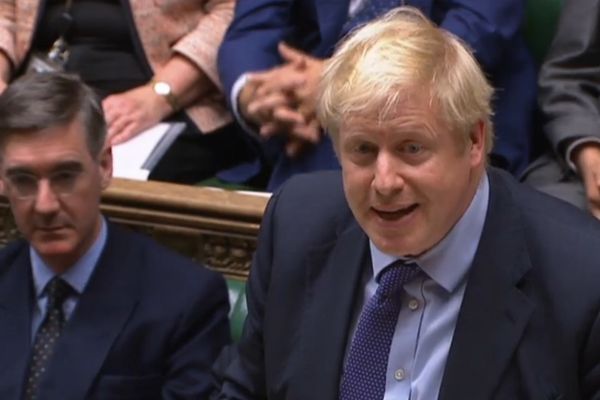- UK.Boris Johnson withdraws the Brexit agreement law after losing a key vote in Westminster
- Editorial: Brexit and the effects of populism
The British Parliament yesterday prevented Prime Minister Boris Johnson from completing Brexit on October 31 with the agreement sealed with Brussels. From 322 to 308, Westminster rejected the calendar proposed by the conservative leader to process the agreement by express route - in just three days - and thus be able to arrive at the date set for the exit of the EU.
The conservative leader decided to press the pause button for his agreement, which however had been approved on a first indicative vote by 329 votes to 299 , and threaten again with an EU exit to the braves. In an intervention during the parliamentary debate, Johnson came to speculate with the call for early elections to leave the political impass .
"I must express my frustration because this House has voted again for a delay, rather than for a calendar to ensure that the United Kingdom can leave the EU on October 31 with an agreement," Johnson said after yesterday's second vote. "We are now facing greater uncertainty, and the EU must decide on how to respond to Parliament's request for a delay. The first consequence is that the Government must adopt the only responsible trajectory and accelerate our preparations for a Brexit without agreement."
Johnson's statement, which minutes before he had celebrated his first and symbolic victory of the Brexit agreement in Parliament (something Theresa May never achieved in his three failed attempts), provoked the angry reaction of dozens of deputies. Veteran Ken Clarke, expelled from the Conservative Party a month ago, asked Johnson to reconsider his position: " I don't understand the logic of withdrawing the law at this point, when the House of Commons hoped to discuss it in the next two days ."
Fear of new opposition maneuvers to try to amend the law and delay its processing beyond October 31 forced Johnson to back down. The premier , however, thanked the "collective achievement" of the first indicative vote on the law, " because nobody believed a few days ago that we could reopen the EU agreement , let alone abolish the safeguard."
Hours earlier, at the start of the parliamentary debate, Johnson came to directly threaten early elections if his Agreement law was rejected by Westminster. " I cannot consent for this to take several more months . If Parliament prevents Brexit from happening, I will withdraw the law and we will have to go to general elections." In a message on Twitter, in the purest Trump style, Johnson launched his final offensive hours earlier: "People don't want any more delays. We will finish Brexit on October 31 and move this country forward ."
Once again, and despite the 30-point victory achieved by the flight of several Labor deputies who decided to challenge Jeremy Corbyn, Johnson crashed into the Westminster wall, which has given him nine losses in three months.
Labor, however, closed ranks with their leader when torpedoing the calendar proposed by the premier. "The prime minister owns his own bad luck," said Corbyn. " So we make a proposal tonight : work with us to agree on an appropriate calendar that allows you to discuss, examine and analyze the details of the law. It is the sensible offer I make tonight on behalf of the opposition." The Labor leader preferred to ignore that his proposal includes the extension of Brexit, approved in advance by Parliament and requested by Johnson himself in a letter (unsigned) sent to Brussels, accompanied by another letter (signed) by the premier and claiming that a delay would be "a mistake."
In his speech, after the double vote on Tuesday, the British president promised to " talk to the EU member states about their intentions until they have reached a decision ." "But let me be clear: our policy remains that there doesn't have to be any delays and that we must leave the EU on October 31st."
To add even more confusion to the situation created by the double vote and the withdrawal of the Brexit agreement, the president of the House of Commons, John Bercow, proclaimed: "The law is not dead, but it is inert. It is not traveling. , nor progressing, one could say that it is static. But it is not a corpse . "
The leader of the Liberal-Democratic Party, Jo Swinson, warned on his part that Parliament had launched a "lifeguard" to Boris Johnson, but that he did not know how to take advantage of it. The 19 liberal-Democratic deputies closed ranks and voted against the agreement and against the proposed calendar. "What we need now is an extension of Article 50 for the law to be examined and to convene a new referendum or early elections," said Swinson. " The premier has to eat his pride and ensure a new extension with our European partners ."
According to the criteria of The Trust Project
Know more- Halloween
- Brexit
BrexitDonald Tusk says that the "fundamental bases" of Brexit are "ready"
Divorce in the EU The toxic glossary of Brexit
BrexitBoris Johnson challenges Queen Elizabeth II

